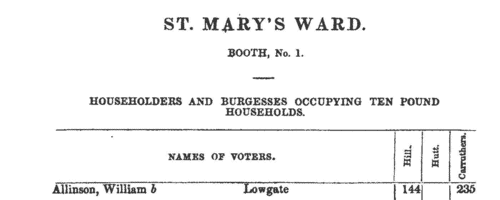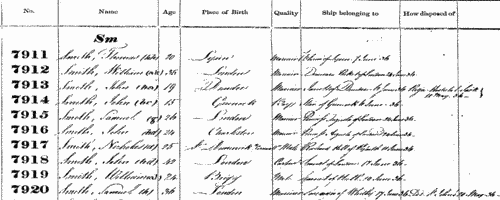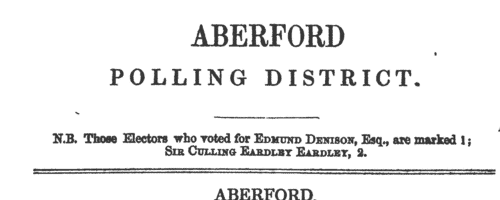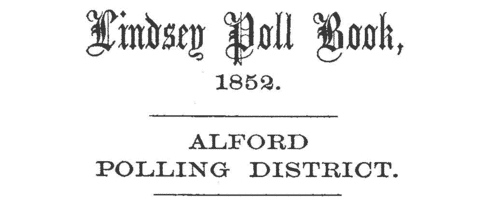Faulding Surname Ancestry ResultsOur indexes 1000-1999 include entries for the spelling 'faulding'. In the period you have requested, we have the following 58 records (displaying 31 to 40): Single Surname Subscription | | | Buying all 58 results of this search individually would cost £356.00. But you can have free access to all 58 records for a year, to view, to save and print, for £100. Save £256.00. More... |
These sample scans are from the original record. You will get scans of the full pages or articles where the surname you searched for has been found. Your web browser may prevent the sample windows from opening; in this case please change your browser settings to allow pop-up windows from this site. Deaths, Marriages, News and Promotions
(1825)
Death notices and obituaries, marriage and birth notices, civil and military promotions, clerical preferments and domestic occurrences, as reported in the Gentleman's Magazine. Mostly from England and Wales, but items from Ireland, Scotland and abroad.
FAULDING. Cost: £4.00.  | Sample scan, click to enlarge

| Petitioning Creditors and Solicitors
(1827)
Principal creditors petitioning to force a bankruptcy (but often close relatives of the bankrupt helping to protect his assets): and solicitorsFAULDING. Cost: £6.00.  | Sample scan, click to enlarge

| Electors in Hull
(1835)
A poll was taken 6 and 7 January 1835 for the election of members to serve in Parliament for the borough of Kingston-upon-Hull, the candidates being Matthew Davenport Hill, William Hutt and David Carruthers. This poll book lists all the electors in the wards of Hull (St Mary's, North, Trinity, Whitefriar, Humber, Austin, and South Myton), in Sculcoates, and in Sutton, Southcoates, Drypool &c. In each ward the names are arranged in five sections: Householders and Burgesses occupying Ten Pound Households; Burgesses not occupying Ten Pound Households; Unpolled Voters residing in the ward; Unpolled Freemen; and Non-Resident Freemen not polling. There are also short lists of votes that were tendered but the validity of which remained uncertain. In all cases full names and addresses are given: where electors voted, their votes are indicated in the right-hand columns, the numbers shown there being their numbers in the cumulating totals for each candidate. After the name of each voter there is an italic a or b showing whether he voted on the first or second day. FAULDING. Cost: £4.00.  | Sample scan, click to enlarge

|  British merchant seamen
(1835-1836) British merchant seamen
(1835-1836)
At this period, the foreign trade of ships plying to and from the British isles involved about 150,000 men on 15,000 ships; and the coasting trade about a quarter as many more. A large proportion of the seamen on these ships were British subjects, and so liable to be pressed for service in the Royal Navy; but there was no general register by which to identify them, so in 1835 parliament passed a Merchant Seamen's Registration Bill. Under this act this large register of British seamen was compiled, based on ships' crew lists gathered in British and Irish ports, and passed up to the registry in London. Each seaman was assigned a number, and the names were arranged in the register by first two letters of the surname (our sample scan shows one of the pages for 'Sm'); in addition, an attempt was made to separate out namesakes by giving the first instance of a name (a), the second (b), and so on. But no effective method was devised to prevent the same man being registered twice as he appeared in a second crew list; moreover, the original crew lists were clearly difficult for the registry clerks to copy, and some of the surname spellings appear to be corrupted. A parliamentary committee decided that the system devised did not answer the original problem, and this register was abandoned after less than two years: but it is an apparently comprehensive source for British merchant seamen in 1835 to 1836. The register records the number assigned to each man; his name; age; birthplace; quality (master, captain, mate, 2nd mate, mariner, seaman, fisherman, cook, carpenter, boy &c.); and the name and home port of his ship, with the date of the crew list (usually at the end of a voyage). Most of the men recorded were born in the British Isles, but not all (for instance, Charleston and Stockholm appear in the sample scan). The final column 'How disposed of' is rarely used, and indicates those instances where a man died, was discharged, or deserted his ship during the voyage.FAULDING. Cost: £8.00.  | Sample scan, click to enlarge

| Bankrupts
(1838)
Bankruptcy notices for England and Wales: bankruptcy often caused people to restart their lives elsewhere, so these are an important source for lost links
FAULDING. Cost: £6.00.  | Sample scan, click to enlarge

| The queen's tradesmen
(1841)
The Lord Chamberlain's Department, the Lord Steward's Department and the Department of the Master of the Horse maintained separate lists of approved tradesmen to supply the royal household.FAULDING. Cost: £6.00.  | Sample scan, click to enlarge

| Railway Subscription Contracts
(1845)
£21,386,703 6s 4d was promised by about 10,000 subscribers of less than £2,000 per contract to the nearly 200 railway bills deposited in the Private Bill Office during the Session of Parliament for 1845. This alphabetical list gives the full names of the subscribers (surname first), description (i. e., occupation), place of abode, a numerical reference to the title of the railway, the amount subscribed to each, and total. There is a separate key to the titles of the railways.FAULDING. Cost: £4.00.  | Sample scan, click to enlarge

| Electors for Swinefleet
(1848)
On 14 and 15 December 1848 an election took place for a Knight of the Shire for the West Riding of Yorkshire in the House of Commons. The candidates were Edmund Denison and sir Culling Eardley Eardley, gaining 14,743 and 11,795 votes respectively. The county franchise at this period included freeholders of land worth 40s or more a year; £10 copyholders and long-leaseholders; and £50 short-leaseholders and tenants. This poll book was published in 1849.
Former poll books had been compiled from the sheriff's returns; but as these were now transmitted to the Home Office immediately after an election, in this instance the polling was marked from the check-clerk's returns, carefully compared with the registers marked in the poll booths at the time of voting.
The votes for the respective candidates are indicated by the numerals 1 (Denison) and 2 (Eardley). The omission of these numerals indicates that the elector did not vote. Many names which appear on the register of particular townships are completely omitted in this poll book: in all these cases, the same name will be found recorded in some other township, the elector having two or more qualifications. In such cases, his name only appears in the poll book in the actual township for which he chose to vote; or, if he did not vote at all, in that township for which he was qualified that lay closest to his actual residence.
The townships are arranged alphabetically within polling district; and within each township the names are arranged alphabetically by surname and christian name, and the elector's residence is given. Many of the electors resided outside the township for which they were qualified - some in other counties. Moreover, at the end of each polling district there is a list of persons registered to poll in that district, from townships is other districts. FAULDING. Cost: £6.00.  | Sample scan, click to enlarge

| Traders and professionals in London
(1851)
The Post Office London Directory for 1851 includes this 'Commercial and Professional Directory', recording about 80,000 individuals. FAULDING. Cost: £4.00.  | Sample scan, click to enlarge

| North Lincolnshire Voters: Barrow
(1852)
The Poll Book for North Lincolnshire (Lindsey) in the General Election of 1852 was prepared from the poll clerks' lists, and so is arranged polling district by polling district, and within those by township or parish, but with non-voters listed separately at the end of each polling district. The 9,620 voters are listed not by residence, but by the parish or township in which lay the property that gave the right to vote: consequently 260 electors appear twice on the register. 1,797 did not vote. Many of the electors lived outside the area, or even outside the county. The names are listed roughly alphabetically by surname, with christian name, residence and occupation: with a key to the nature of their property (freehold fr, rented rt, or copyhold ch), and for whom the votes were cast (CR.: Rt. Hon. R. A. Christopher, who received 5,585 votes; CH.: Sir Montague J. Cholmeley, 4,777; S.: James Banks Stanhope, 5,575). Each elector had two votes. The franchise comprised all adult males in possession of 40s freehold, or £10 copyhold or leasehold, annual value.FAULDING. Cost: £6.00.  | Sample scan, click to enlarge

|
Research your ancestry, family history, genealogy and one-name study by direct access to original records and archives indexed by surname.
|













